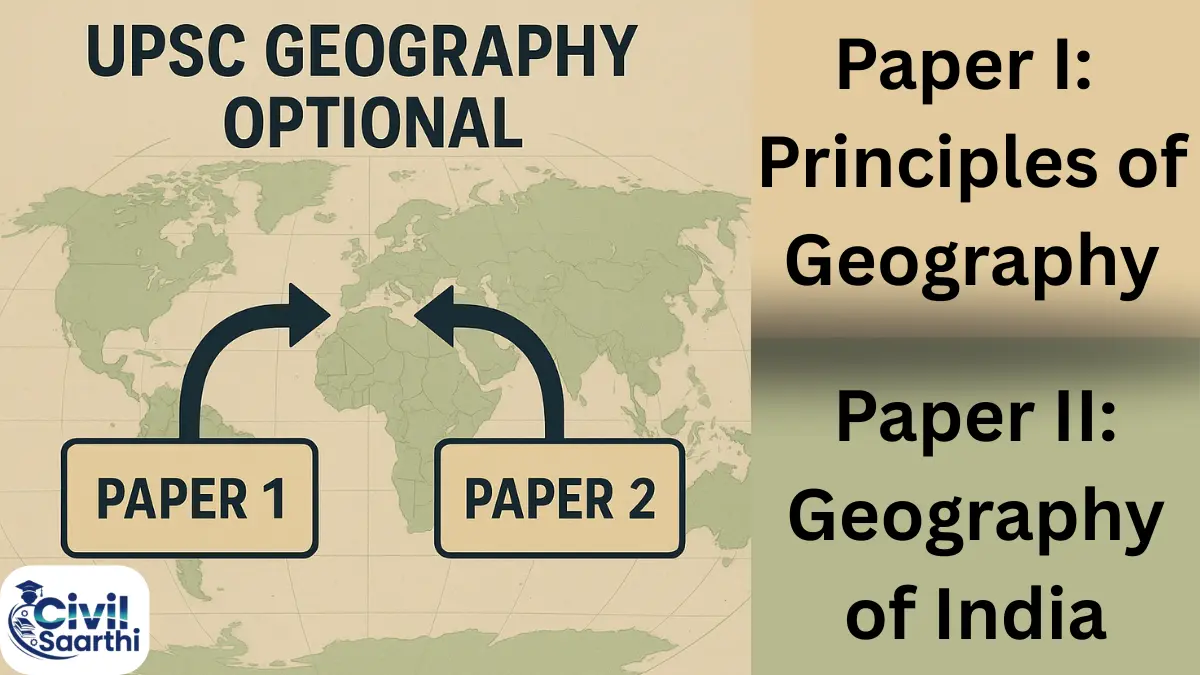The UPSC Geography Optional Syllabus is a pivotal component for aspirants aiming to excel in the Civil Services Examination. Geography, as an optional subject, offers a blend of scientific concepts and socio-economic perspectives, making it a popular choice among candidates. This article provides an in-depth overview of the UPSC Geography Optional Syllabus, ensuring that aspirants are well-equipped to navigate through the topics effectively.
UPSC Geography Optional Syllabus
The UPSC Geography Optional Syllabus is divided into two papers Paper I: Principles of Geography (Physical and Human Geography) and Paper II: Geography of India. Each paper carries 250 marks, contributing to a total of 500 marks for the optional subject. The syllabus is comprehensive yet logical, making it suitable for aspirants from all academic backgrounds and highly relevant to current affairs and General Studies preparation.
Why to Choose UPSC Geography Optional Syllabus?
Choosing Geography as an optional subject for the UPSC CSE Exam 2025 is a smart move for many aspirants. It’s a subject that balances both science and humanities, making it approachable for students from various academic backgrounds. The UPSC Geography Optional Syllabus is well-structured, overlaps with the GS papers (especially GS Paper I and III), and offers clarity in concepts that are easy to understand and revise. Plus, with the right strategy, Geography can be a highly scoring optional subject.
UPSC Geography Optional Syllabus Overview
The overview table describing the details related to the UPSC Geography Optional Syllabus has been provided below.
UPSC Geography Optional Syllabus Overview | |||
| Paper | Title | Focus Areas | Marks |
| I | Principles of Geography | Physical Geography, Human Geography | 250 |
| II | Geography of India | Indian Physical Features, Resources, Economy, Society | 250 |
| Total | 500 | ||
UPSC Geography Optional Syllabus PDF
UPSC Geography Optional Syllabus PDF is available to download. This syllabus is the official syllabus designed as per UPSC Notification.
Click here to Download UPSC Optional Syllabus Geography PDF
UPSC Geography Optional Paper I: Principles of Geography
UPSC Geography Optional Paper I, lays the foundation for understanding the core concepts of physical and human geography. This paper explores the natural processes shaping our planet like landforms, climate, and ecosystems along with how humans interact with and influence these systems.
Physical Geography :
- Geomorphology : Factors controlling landform development; endogenetic and exogenetic forces; Origin and evolution of the earth’s crusts; Fundamentals of geomagnetism; Physical conditions of the earth’s interior; Geosynclines; Continental drift; Isostasy; Plate tectonics; Recent views on mountain building; Volcanicity; Earthquakes and Tsunamis; Concepts of geomorphic cycles and Land scape development; Denudation chronology; Channel morphology; Erosion surfaces; Slope development; Applied Geomorphology; Geomorphology, economic geology and environment.
- Climatology : Temperature and pressure belts of the world; Heat budget of the earth; Atmospheric circulation; Atmospheric stability and instability. Planetary and local winds; Monsoons and jet streams; Air masses and fronto; Temperate and tropical cyclones; Types and distribution of precipitation; Weather and Climate; Koppen’s Thornthwaite’s and Trewar Tha’s classification of world climate; Hydrological cycle; Global climatic change, and role and response of man in climatic changes Applied climatology and Urban climate.
- Oceanography : Bottom topography of the Atlantic, Indian and Pacific Oceans; Temperature and salinity of the oceans; Heat and salt budgets, Ocean deposits; Waves, currents and tides; Marine resources; biotic, mineral and energy resources; Coral reefs coral bleaching; Sea-level changes; Law of the sea and marine pollution.
- Biogeography : Genesis of soils; Classification and distribution of soils; Soil profile; Soil erosion, Degrada-tion and conservation; Factors influencing world distribution of plants and animals; Problems of deforestation and conservation measures; Social forestry, agroforestry; Wild life; Major gene pool centres.
- Environmental Geography : Principle ecology; Human ecological adaptations; Influence of man on ecology and environment; Global and regional ecological changes and imbalances; Ecosystem their management and conservation; Environmental degradation, management and conservation; Biodiversity and sustainable development; Environmental policy; Environmental hazards and remedial measures; Environmental education and legislation.
Human Geography
- Perspectives in Human Geography : Areal differentiation; Regional synthesis; Dichotomy and dualism; Environmentalism; Quantitative revolution and locational analysis; Radical, behavioural, human and welfare approaches; Languages, religions and secularisation; Cultural regions of the world; Human development Index.
- Economic Geography : World economic development: measurement and problems; World resources and their distribution; Energy crisis; the limits to growth; World agriculture: typology of agricultural regions; Agricultural inputs and productivity; Food and nutritions problems; Food security; famine: causes, effects and remedies; World industries: location patterns and problems; Patterns of world trade.
- Population and Settlement Geography : Growth and distribution of world population; Demographic attributes; Causes and consequences of migration; Concepts of over-under-and optimum population; Population theories, world population problems and policies, Social well-being and quality of life; Population as social capital. Types and patterns of rural settlements; Environmental issues in rural settlements; Hierarchy of urban settlements; Urban morphology; Concept of primate city and rank-size rule; Functional classification of towns; Sphere of urban influence; Rural-urban fringe; Satellite towns; Problems and remedies of urbanization; Sustainable development of cities.
- Regional Planning : Concept of a region; Types of regions and methods of regionalisation; Growth centres and growth poles; Regional imbalances; Regional development strategies; Environmental issues in regional planning; Planning for sustainable development.
- Models, Theories and Laws in Human Geography : System analysis in Human geography; Malthusian, Marxian and demographic transition models; Central Place theories of Christaller and Losch; Perroux and Boudeville; Von Thunen’s model of agricultural location; Weber’s model of industrial location; Ostov’s model of stages of growth. Heart-land and Rimland theories; Laws of international boundaries and frontiers.
UPSC Geography Optional Paper II: Geography of India
The UPSC Geography Optional Syllabus for Paper II emphasizes the geographical aspects specific to India, covering physical features, resources, agriculture, industries, and contemporary issues.
Geography of India
- Physical Setting : Space relationship of India with neighbouring countries; Structure and relief; Drainage system and watersheds; Physiographic regions; Mechanism of Indian monsoons and rainfall patterns; Tropical cyclones and western disturbances; Floods and droughts; Climatic regions; Natural vegetation, Soil types and their distributions.
- Resources : Land, surface and groundwater, energy, minerals, biotic and marine resources, Forest and wildlife resources and their conservation; Energy crisis.
- Agriculture : Infrastructure: irrigation, seeds, fertilizers, power; Institutional factors; land holdings, land tenure and land reforms; Cropping pattern, agricultural productivity, agricultural intensity, crop combination, land capability; Agro and social-forestry; Green revolution and its socio-economic and ecological implications; Significance of dry farming; Livestock resources and white revolution; Aqua-culture; Sericulture, Agriculture and poultry; Agricultural regionalisation; Agro-climatic zones; Agro-ecological regions.
- Industry : Evolution of industries; Locational factors of cotton, jute, textile, iron and steel, aluminium, fertiliser, paper, chemical and pharmaceutical, automobile, cottage and agro-based industries; Industrial houses and complexes including public sector underkings; Industrial regionalisation; New industrial policy; Multinationals and liberalisation; Special Economic Zones; Tourism including ecotourism.
- Transport, Communication and Trade : Road, railway, waterway, airway and pipeline networks and their complementary roles in regional development; Growing importance of ports on national and foreign trade; Trade balance; Trade Policy;Export processing zones; Developments in communication and information technology and their impacts on economy and society; Indian space programme.
- Cultural Setting : Historical Perspective of Indian Society; Racial linguistic and ethnic diversities; religious minorities; Major tribes, tribal areas and their problems; Cultural regions; Growth, distribution and density of population; Demographic attributes: sex-ratio, age structure, literacy rate, work-force, dependency ratio, longevity; migration (inter-regional, interaregional and international) and associated problems; Population problems and policies; Health indicators.
- Settlements : Types, patterns and morphology of rural settlements; Urban developments; Morphology of Indian cities; Functional classification of Indian cities; Conurbations and metropolitan regions; Urban sprawl; Slums and asssociated problems; Town planning; Problems of urbanisation and remedies.
- Regional Development and Planning: Experience of regional planning in India; Five Year Plans; Integrated rural development programmes; Panchayati Raj and decentralised planning; Command area development; Watershed management; Planning for backward area, desert, drought-prone, hill tribal area development; Multi-level planning; Regional planning and development of island territories.
- Political Aspects : Geographical basis of Indian federalism; State reorganisation; Emergence of new states; Regional consciousness and inter-state issues; International boundary of India and related issues; Cross-border terrorism; India’s role in world affairs; Geopolitics of South Asia and Indian Ocean realm.
- Contemporary Issues : Ecological issues: Environmental hazards: landslides, earthquakes, Tsunamis, floods and droughts, epidemics; Issues related to environmental pollution; Changes in patterns of land use; Principles of environmental impact assessment and environmental management; Population explosion and food security; Environmental degradation; Deforestation, desertification and soil erosion; Problems of agrarian and industrial unrest; Regional disparities in economic development; Concept of sustainable growth and development; Environmental awareness; Linkage of rivers; Globalisation and Indian economy.
Best Books for UPSC Geography Optional Syllabus
Best Books for UPSC Geography Optional Syllabus are those that simplify complex topics, strengthen your conceptual understanding, and align well with the exam pattern. These books help you cover both Paper I and II effectively, offering clarity in theory as well as practical applications like maps and case studies.
Best Books for UPSC Geography Optional Syllabus | ||
| Paper | Topic | Recommended Books |
| Paper I: Principles of Geography | Geomorphology, Climatology, Oceanography | – Physical Geography by Savindra Singh- Geomorphology by Savindra Singh- Climatology by D.S. Lal |
| Biogeography, Environmental Geography | – Environmental Geography by Savindra Singh- NCERT Class 11 & 12 Geography Books | |
| Perspectives in Human Geography | – Perspectives in Human Geography by Majid Husain- R.D. Dikshit (selected topics) | |
| Paper II: Geography of India | Physical, Economic, Social Geography | – Geography of India by Majid Husain- Certificate Physical and Human Geography by G.C. Leong (for basics) |
| Regional Planning, Contemporary Issues | – NCERT Geography Class 12: India – People and Economy- Current Affairs Magazines (Yojana, Kurukshetra) | |
| Atlas & Maps | Map-based Questions | – Oxford School Atlas by Oxford University Press |
Preparation Tips for UPSC Geography Optional Syllabus
Preparation Tips for the UPSC Geography Optional Syllabus have been discussed below in detail for candidates who are going to appear in the UPSC CSE Mains Exam 2025.
- Understand the Syllabus Thoroughly: Break it down topic-wise for both Paper I and II to know exactly what to cover.
- Stick to Limited Resources: Choose a few standard books and revise them well instead of collecting too much material.
- Make Short Notes: Create crisp notes for quick revision, especially for concepts, definitions, and case studies.
- Link Paper I and II: Try to connect physical geography concepts from Paper I with Indian geography in Paper II for better understanding.
- Focus on Maps and Diagrams: Practice map-based questions regularly and learn to draw neat, labeled diagrams to boost your score.
- Revise Regularly: Plan monthly revisions to avoid forgetting older topics while moving ahead.
- Practice Answer Writing: Write answers with proper structure—introduction, body, and conclusion with relevant examples and maps.
- Analyze Previous Year Papers: Understand the trend and frequently asked topics to prepare smartly.
- Stay Updated: Relate geographical issues with current affairs, especially for Paper II topics like environment and development.
- Be Consistent and Patient: Geography is vast, so stay steady and give it time concept clarity builds over regular study.
UPSC Geography Optional Syllabus FAQs
Is the UPSC Geography Optional Syllabus suitable for candidates without a background in Geography?
Yes, the UPSC Geography Optional Syllabus is structured in a way that candidates from various academic backgrounds can comprehend and prepare effectively with the right resources and guidance.
How does the UPSC Geography Optional Syllabus overlap with the General Studies papers?
The UPSC Geography Optional Syllabus has significant overlap with GS Paper I, particularly in areas like physical geography, human geography, and environmental issues, providing an added advantage to candidates.
What is the importance of map-based questions in the UPSC Geography Optional Syllabus?
Map-based questions are integral to the UPSC Geography Optional Syllabus, testing candidates’ spatial understanding and ability to represent geographical data accurately.
How should one approach the dynamic aspects of the UPSC Geography Optional Syllabus?
Staying updated with current affairs, environmental reports, and recent geographical developments is crucial for tackling the dynamic components of the UPSC Geography Optional Syllabus.
Are there any recommended resources for the UPSC Geography Optional Syllabus?
Standard textbooks, government reports, and reputable coaching materials aligned with the UPSC Geography Optional Syllabus are recommended for comprehensive preparation.
How much time should be allocated to each paper in the UPSC Geography Optional Syllabus?
A balanced approach, dedicating equal time to both Paper I and Paper II of the UPSC Geography Optional Syllabus, ensures thorough coverage and understanding of all topics.
Can previous years’ question papers aid in understanding the UPSC Geography Optional Syllabus?
Analyzing past question papers is beneficial for grasping the pattern, frequently asked topics, and the depth of questions related to the UPSC Geography Optional Syllabus.







